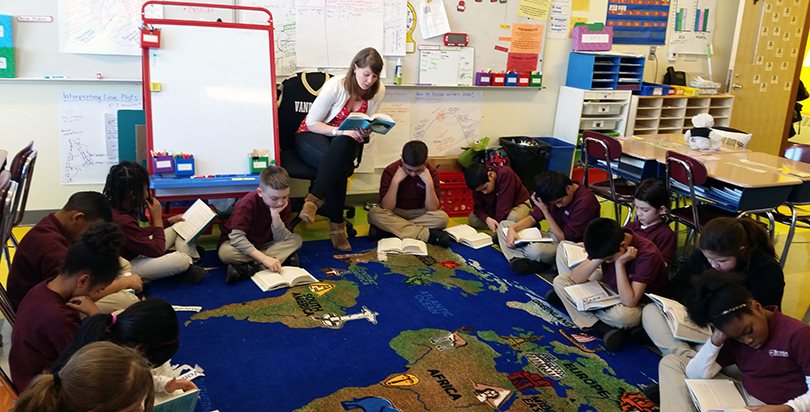Campbell Brown: Poor Students’ Futures Are on the Ballot in Massachusetts This November

This essay was published in partnership with The Daily Beast.
In The Founders, his new book about top charter schools, Richard Whitmire traces both the “revolution” these schools brought about in many American cities as well as a parallel phenomenon, the “charter pushback campaigns.”
Consider the gathering storm over public charter schools in Massachusetts, which Whitmire deftly examines. In November, voters will decide whether to support a ballot initiative allowing the state to add 12 new or expanded charters annually. Low-performing districts get priority. (Read his previous coverage on The 74: The Fight for the Future of Massachusetts’ Charter Schools)
Voters from the Berkshires to Cape Cod will be able to weigh in, but in effect they will be determining educational opportunity for only a fraction of the state: low-income, mostly minority students in Boston and a few smaller cities.
Boston is projected to enroll 10,000 students in charters this year, about one quarter of the state total, while keeping another 10,000 on waiting lists, according to state estimates.
(The 74 Newsletter: Sign up for breaking news and daily analysis)
Put another way, in the 2016–17 school year, more than one out of every three Boston public school students will be in charters or will wish they were.
But because the district has reached its limit, most of those 10,000 kids won’t get near a seat unless the cap is raised, which is tragic because Boston charters aren’t just good, or even very good. They’re probably the best in the country.
Consider what researchers have found:
In a widely cited 2015 study of charter performance in 41 urban areas, Stanford University determined that “the magnitude of the gains that charter school students in Boston received compared with their traditional public school counterparts is the largest we’ve seen in any area of the country we have studied.”
More remarkable, the study found that Boston charter students achieved four times as much growth in reading and six times as much growth in math as their peers in Boston’s traditional schools — a difference equivalent to hundreds of extra days of school. The biggest gains were made by low-income black and Hispanic students.
The findings echo a 2013 analysis showing Boston charter students learned at twice the rate of other public school students, making 12 months more progress in reading over a year and 13 months more progress in math. And these results weren’t concentrated in just a few schools run by the best-known operators. To the contrary, 83 percent of Boston charters outperformed traditional schools in reading and math, and no charters performed worse than traditional schools.
Charter opponents often try to delegitimize strong testing results like those in Boston by attributing them to excessive test prep — as New York City Mayor Bill de Blasio did recently. (As if that were the only way poor students can excel!)
But a Harvard researcher found that despite “perverse incentives” for charters to focus on a narrow range of material because of accountability pressure, there was “no evidence of this type of test preparation” among Boston charters.
Finally, countering the notion that charters produce falsely impressive short-term gains only, a team led by MIT economists found that, in addition to improving academic achievement, attending Boston charters increases the likelihood that a student will take AP exams, improves SAT scores and makes attendance at a four-year college rather than community college more likely.
Around now I should provide a spoiler alert for anyone who still believes evidence or good faith is important in public policy-making. Given the unrivaled gains made by Boston charters compared with district schools, the readiness of the charters to educate thousands of additional city students seems like a gift from the gods.
But here’s how Barbara Madeloni, president of the state teachers union, feels about it: “Any cap lift portends the destabilization of public education in a profound way.” And again: “This proposal [for a ballot initiative] is a strike against democracy, against teacher and parent input into the education of students and against the principle that all students are entitled to a high-quality public education.”
Wow. For Madeloni, her union, and their supporters, Boston charters are an extraordinary menace. Not because they are failing poor children of color but because they are serving them so well. The $9 million that the Massachusetts Teachers Association has already pledged to spend in order to prevent even one more child from learning in a Boston charter school will be followed by millions more — its national union, based in Washington, D.C., has already announced a $1.4 million contribution. It reflects the threat that Boston charters pose to the continued domination of unions over urban public education.
Think about it: spending millions of dollars to keep disadvantaged children in vastly inferior schools. Blocking entry into extraordinary schools so that poor ones aren’t “destabilized.”
The threat is not confined to Boston but matters most there. If Boston charters can be stymied despite their extraordinary success, charters anywhere can be stopped. Madeloni and her supporters are committed to preserving power. To succeed, she needs students in charter schools to fail.
The clear good here is to stand with poor kids in Boston and support the cap lift.
Get stories like these delivered straight to your inbox. Sign up for The 74 Newsletter

;)
